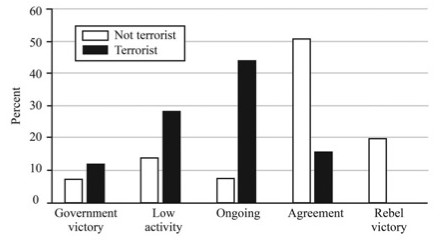
Chadian soldiers escorting a group of journalists ride on trucks and pickups in the city of Damasak, Nigeria, Wednesday March 18, 2015. Jerome Delay/AP
How Terrorism Prolongs Conflict But Loses the War
Rebel groups that employ the tactic in civil wars seldom win or gain concessions—but they tend to make ending a conflict much more difficult, a new paper finds.
Nearly 14 years into the war on terror, there are signs of terrorism all around us, from Memorial Day tributes to the victims of the wars in Iraq and Afghanistan to the raging congressional debate over reauthorizing the Patriot Act.
Yet some of the most basic information about terrorism remains surprisingly elusive. For example: Does it work?
There have been some attempts at answering the question, but many of them are either largely anecdotal or geographically constrained. Other studies have focused on international terror. But as political scientist Page Fortna of Columbia University notes, the vast majority of terrorism isn’t transnational—it’s localized, utilized in the context of civil wars and fights for territorial control. Many of the intractable conflicts the U.S. is involved in today fit this definition: the fighting between ISIS, Jabhat al-Nusra, and other groups in Iraq and Syria; the Boko Haram insurgency in Nigeria; al-Shabab’s terrorism in Somalia and Kenya; Yemen’s civil war; the Israel-Palestinian conflict. Is terrorism an effective tool when used in those conflicts?
In short, no. “The disadvantages of terrorism generally outweigh its advantages,” Fortna writes in a new paper,“Do Terrorists Win? Rebels’ Use of Terrorism and Civil War Outcomes.” She ranks the possible results of conflicts for groups from worst to best—with total defeat, “fizzling,” and stalemate on one side, and negotiated settlement and outright victory on the other. Fortna finds that terror “is a cheap way to inflict pain on the other side, and terrorist groups are hard to eliminate completely, but it is useless for taking or holding territory.”
Studying terror requires defining it. Fortna considers 104 rebel groups fighting in large civil wars, all of them since 1989. Among them, organizations that engage in systematic, indiscriminate violence against civilian targets for political purposes qualify as terrorist groups. The time limitation offers a more useful picture of the current landscape of terrorism, cutting off the examples of rebel movements—many using terror—that successfully gained independence in the post-colonial era (think Algeria).
The results of the 104 cases are striking. Non-terrorist movements are far more likely to win a settlement or an outright victory, while terrorist movements tend to lose, fizzle out, or drag on. “Of the groups examined here, none of those that deliberately killed large numbers of civilians through terrorist attacks won its fight outright,” Fortna writes.
What Kind of Rebel Group Wins Civil Wars?

What terrorism does do well is prolong wars—as the heavy clustering around the “low activity” and “ongoing” categories in the chart illustrates. This appears to demonstrate why groups might turn to terror and why the strategy falters. Since deploying terrorism makes wars longer, it also lengthens the lifespans of the groups that are engaging in it. One reason for this is that it’s hard for authorities to stamp out a terror campaign. But it’s also very hard for terrorist groups to capture and hold territory, an essential goal in a civil war.
That’s perhaps why Fortna finds that secessionist groups are unlikely to employ terror. Surprisingly, however, it turns out that weaker groups are not more likely to use terrorism than stronger ones. That’s an entrenched notion, running back to the days of Frantz Fanon and the Algerian revolution, and it makes sense: If a terror campaign is cheap and easy to mount, a group with modest resources is likely to use it. But Fortna finds no such pattern. She also finds that, contrary to common belief, democracies are not significantly more vulnerable to the effects of terror campaigns than other types of government.
But what about complex rebellions, where many groups rebel against the government, some using traditional means and others using terrorism? In such a case, couldn’t the extremism of a terrorist group help shift the conflict overall, and perhaps make it easier for a non-terrorist group to reach a positive resolution? I put this good cop/bad cop scenario to Fortna in an email, and she said the case doesn’t pop up much:
The question here is what does "success" mean in this case, or success for whom? This would be success from the point of view of the overall cause, and from the non-terrorist group, but whether it's success from the point of view of the terrorist group is questionable. I haven't looked at this very systematically, but I don't think there are a lot of cases in these data where a non-terrorist group reached an agreement but a terrorist group representing the same population or cause is coded as failing or ongoing, that is where the "success" of the non-terrorist case might really have been caused, or at least aided by the terrorist group.
The idea that terrorism usually fails, and that at best it’s a stalling tactic, would seem to be a positive one. The impact of America’s post-9/11 “War on Terror” is staggering, regardless of which estimate of its cost you believe—$1.6 trillion? $5 trillion? And as this Memorial Day holiday reminds us, there’s an immense human—as well as psychological and civil-liberties—cost to fighting terror. My colleague Conor Friedersdorf has noted that the fear generated by terrorism (a main goal of the tool, of course) has left Americans in a state of elevated anxiety and persuaded them to surrender civil liberties. An understanding that terrorism is unlikely to work could have salubrious effects.